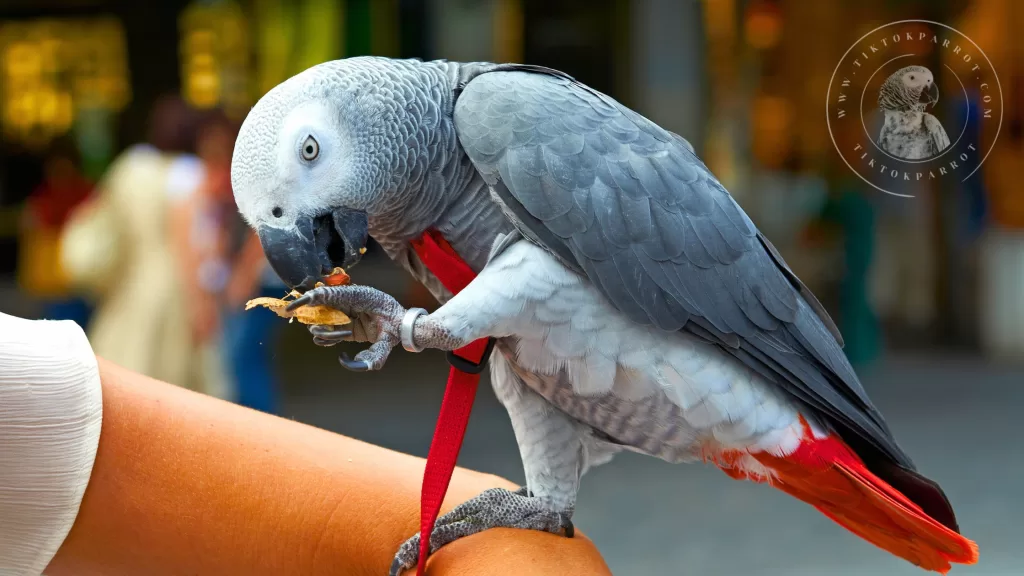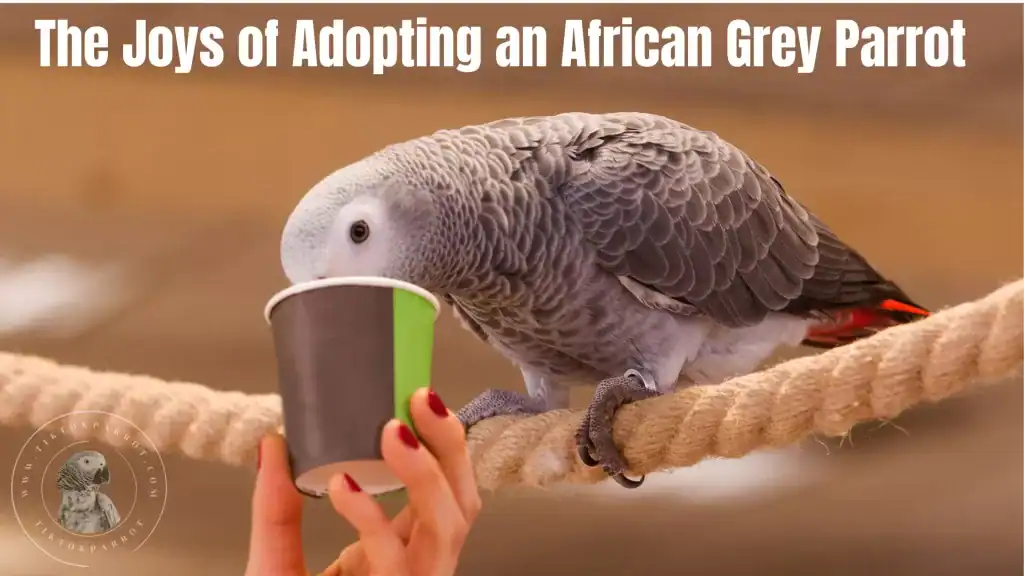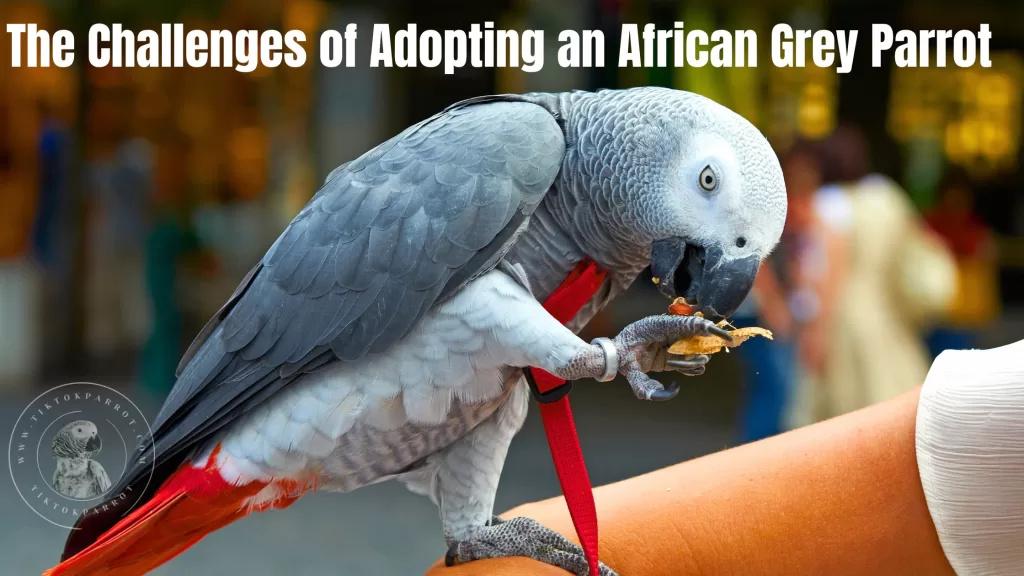Adopting a pet is a decision that brings immense joy and fulfillment to our lives. When it comes to choosing a feathered companion, the African Grey parrot stands out as a popular choice among bird enthusiasts.
These intelligent and charismatic creatures have captured the hearts of many with their striking appearance and remarkable abilities. However, like any other pet, adopting an African Grey Parrot comes with its own set of joys and challenges.
Discover the joys and challenges of adopting an African Grey Parrot. From their intelligence and captivating beauty to the lifelong bonds they form, explore the unique aspects of owning these remarkable birds. Learn how to overcome challenges and create a fulfilling relationship with your African Grey Parrot.
In this article, we will explore the unique aspects of having an African Grey parrot as a pet, diving into the incredible joys it brings as well as the challenges that come along with it.
The Joys of Adopting an African Grey Parrot
1. A Vibrant and Intelligent Companion
Having an African Grey parrot in your life means never experiencing a dull moment. These birds are known for their exceptional intelligence, rivaling that of a young child. They possess an astonishing ability to mimic human speech, often displaying an impressive vocabulary. The joy of hearing your African Grey greet you with a cheerful “hello” or engage in meaningful conversations is unparalleled.
2. Unforgettable Bonds and Social Interaction
African Greys are highly social creatures that thrive on interaction and companionship. Adopting one opens the door to a deep and meaningful bond that can last a lifetime. They are known to form strong attachments to their human caregivers, becoming loyal and affectionate companions. The joy of having a feathered friend who eagerly awaits your return and showers you with love is truly heartwarming.
3. Fascinating Behaviors and Quirks
Every African Grey Parrot has its unique personality and quirks, making them endlessly fascinating to observe and interact with. From their mischievous antics to their inquisitive nature, they provide constant entertainment and amusement. Their ability to problem-solve and learn new tricks is astounding, adding an extra layer of joy to the experience of owning one.
4. Emotional Intelligence and Empathy
African Grey Parrots possess a high level of emotional intelligence, enabling them to pick up on their owners’ moods and respond with empathy. They can offer comfort during difficult times and bring joy during moments of happiness. Their ability to connect with humans on an emotional level is a truly remarkable aspect of having them as pets.
5. Beauty and Elegance
With their striking gray plumage and bright red tails, African Grey Parrots are undeniably beautiful creatures. Their elegant appearance adds a touch of grace and sophistication to any home. Their visual appeal is often a source of pride and joy for their owners.
6. Educational Opportunities
Adopting an African Grey Parrot can be a fantastic educational experience, especially for families with children. These birds provide an opportunity to learn about avian behavior, habitats, and conservation efforts. Encouraging children to actively participate in the care and training of a pet African Grey Parrot can foster a lifelong love for animals and nature.
The Challenges of Adopting an African Grey Parrot
1. Long Lifespan
One of the primary challenges of adopting an African Grey Parrot is their long lifespan. These birds can live for several decades, with some reaching up to 50 or even 60 years of age. While this longevity can be seen as a positive aspect, it also means committing to the responsibility of caring for a pet that may outlive its owner.
2. High Level of Attention and Stimulation Required
African Grey Parrots are highly intelligent creatures that require mental and physical stimulation on a daily basis. Failing to provide adequate enrichment can lead to boredom, which may result in behavioral issues such as feather plucking or excessive screaming. Owners must be prepared to invest time and effort into engaging their African Grey Parrot in activities that challenge their intellect and keep them entertained.
3. Vocalization and Noise
African Grey Parrots have a naturally loud call and are capable of producing a wide range of vocalizations. While this can be endearing to some, it can be challenging for those living in apartments or close quarters with neighbors. Training and providing appropriate outlets for vocalization can help manage this challenge.
4. Mess and Dust
Like many parrot species, African Grey Parrots can be messy. They produce feather dust, and their feeding habits can result in scattered food and debris. Regular cleaning and maintenance are necessary to keep their environment clean and hygienic.
5. Feather Plucking and Self-Destructive Behavior
African Grey Parrots are prone to feather plucking and self-destructive behavior if they become stressed or bored. This can be a significant challenge for owners, as addressing the underlying causes and providing a stimulating environment requires patience and commitment.
6. Specialized Diet and Health Concerns
Proper nutrition is crucial for the health and well-being of African Grey Parrots. They have specific dietary requirements that must be met to prevent nutritional deficiencies and related health issues. Owners must be knowledgeable about their dietary needs and provide a balanced and varied diet. Regular veterinary check-ups are also essential to detect and address any health concerns promptly.
Frequently Asked Questions (FAQs)
How long do African Grey Parrots live?
African Grey Parrots have an exceptionally long lifespan, often living for several decades. On average, they can live between 40 to 60 years, with some individuals reaching even older ages up to 80 years if well looked after.
Can African Grey Parrots talk?
Yes, African Grey parrots are renowned for their ability to mimic and comprehend human speech. With proper training and socialization, they can develop an extensive vocabulary and engage in meaningful conversations.
Are African Grey Parrots suitable for families with children?
African Grey Parrots can be suitable for families with children, but it is essential to supervise interactions between the bird and young children. These birds require gentle handling and may become stressed by loud noises or sudden movements. It is crucial to educate children about proper parrot care and respect for their feathered friend.
How do I prevent my African Grey Parrot from feather plucking?
Feather plucking can be a complex issue with various underlying causes. Providing a stimulating environment, regular social interaction, a balanced diet, and addressing any potential sources of stress are essential steps in preventing feather plucking. Consulting with an avian veterinarian or a qualified avian behaviorist can also provide valuable guidance.
Can African Grey Parrots be trained to do tricks?
Yes, African Grey Parrots are highly trainable and can learn an array of tricks and commands. Their intelligence and eagerness to please make them excellent candidates for training. Positive reinforcement techniques, such as clicker training, can be highly effective in teaching them new behaviors.
How do I ensure my African Grey Parrot’s well-being?
To ensure your African Grey Parrot’s well-being, provide a spacious and stimulating environment, a balanced diet, regular social interaction, mental enrichment activities, and veterinary care. Additionally, spend quality time with your parrot to foster a strong bond and provide the emotional support they need.
Are African Grey Parrots noisy pets?
African Grey Parrots can be vocal and produce a variety of sounds, including calls, whistles, and mimicry of human speech. However, their noise level can vary depending on individual personality and training. With proper guidance and socialization, their vocalizations can be managed.
Do African Grey Parrots require a lot of space?
While African Grey Parrots are medium-sized birds, they do require ample space to move around and stretch their wings. Providing a spacious cage and regular out-of-cage time for exercise is important for their physical and mental well-being.
Can African Grey Parrots be left alone for long periods?
African Grey Parrots are highly social birds and thrive on interaction. Leaving them alone for extended periods can lead to boredom and behavioral issues. It is best to provide them with regular social stimulation and companionship.
Do African Grey Parrots get along with other pets?
With proper introductions and supervision, African Grey Parrots can coexist with other pets. However, it is crucial to ensure the safety of both the parrot and the other animals. Some precautions may be necessary, especially with predatory pets like cats or dogs.
What is the average cost of owning an African Grey Parrot?
The cost of owning an African Grey Parrot includes the initial purchase price of the bird, as well as ongoing expenses such as a suitable cage, toys, high-quality food, and veterinary care. The total cost can vary depending on factors such as location and the availability of avian specialists.
Can African Grey Parrots be potty trained?
African Grey Parrots can be trained to a certain extent to control their droppings. By observing their behavior and providing consistent cues, owners can encourage their parrots to eliminate in specific areas, such as a designated perch or a lined tray.
Do African Grey Parrots require a specific lighting schedule?
African Grey Parrots benefit from exposure to natural light or full-spectrum lighting that mimics natural sunlight. A regular lighting schedule, including exposure to natural daylight, helps regulate their circadian rhythm and supports overall health.
Are African Grey Parrots prone to specific health issues?
African Grey Parrots are susceptible to various health conditions, including nutritional deficiencies, respiratory problems, feather plucking, and beak and feather disease. Regular veterinary check-ups and a well-balanced diet are crucial to prevent and address these issues.
Can African Grey Parrots be trained to perform specific tasks?
African Grey Parrots are highly trainable and can learn to perform specific tasks or behaviors through positive reinforcement training. With patience, consistency, and rewards, they can be taught tricks, such as retrieving objects, stepping up, or even playing games.
Do African Grey Parrots require a lot of grooming?
African Grey Parrots have specific grooming needs, including nail trims and beak maintenance. Their nails should be kept at a suitable length to prevent discomfort or injuries, and their beaks naturally wear down but may still require occasional shaping by a qualified avian veterinarian.
Can African Grey Parrots be taken outside?
It is possible to take African Grey Parrots outside, but precautions must be taken to ensure their safety. Outdoor time should be supervised, and they should never be exposed to extreme temperatures or potential hazards. A secure harness can be used for supervised outdoor excursions.
Are African Grey Parrots prone to biting?
African Grey Parrots have strong beaks and may resort to biting if they feel threatened, stressed, or uncomfortable. Proper training, socialization, and understanding their body language can help prevent biting incidents.
Do African Grey Parrots require a specific diet?
Yes, African Grey Parrots have specific dietary requirements. They need a balanced diet consisting of high-quality pellets, fresh fruits, vegetables, and occasional nuts or seeds. It is essential to avoid feeding them toxic or harmful foods like chocolate, caffeine, or avocados.
Can African Grey Parrots be taught tricks or behaviors?
Absolutely! African Grey Parrots are highly intelligent and can be trained to learn a wide range of tricks and behaviors. Positive reinforcement training techniques, such as using treats and praise, can be effective in teaching them new skills.
Are African Grey Parrots good for first-time bird owners?
African Grey Parrots require experienced bird owners due to their high level of intelligence and their need for mental and physical stimulation. They may not be the best choice for first-time bird owners who may benefit from starting with a less demanding bird species.
Do African Grey Parrots need to be bathed?
African Grey Parrots enjoy bathing and should be provided with opportunities to clean themselves. This can be done by offering a shallow dish of water or using a spray bottle to mist them lightly. Regular bathing helps keep their feathers clean and healthy.
Can African Grey Parrots be left alone during the day?
While African Grey Parrots can tolerate being alone for moderate periods, they require social interaction and mental stimulation. Leaving them alone for long periods consistently can lead to loneliness and potential behavioral issues.
Are African Grey Parrots suitable for apartments?
African Grey Parrots can be kept in apartments, but their vocalizations can be loud at times. Proper training and socialization can help minimize excessive noise, but consideration should be given to neighbors and noise regulations in apartment buildings.
Can African Grey Parrots fly?
Yes, African Grey Parrots are capable of flight. However, their wings are often clipped for safety reasons, preventing them from flying long distances. Providing a safe and controlled environment for supervised flight exercise is important for their physical well-being.
How do African Grey Parrots communicate?
African Grey Parrots communicate through a combination of vocalizations, body language, and mimicry. They can mimic human speech, environmental sounds, and even replicate specific tones or accents.
Do African Grey Parrots require a lot of toys and enrichment?
African Grey Parrots are intelligent and curious birds that require mental stimulation. Providing a variety of toys, puzzles, and foraging opportunities is essential to keep them mentally engaged and prevent boredom.
Can African Grey Parrots be trained to be potty trained?
While it is challenging to potty train African Grey Parrots completely, they can be trained to eliminate in specific designated areas within their cage or on a perch. Consistency and positive reinforcement can encourage them to use these areas.
Do African Grey Parrots require a specific sleep schedule?
African Grey Parrots need 10-12 hours of uninterrupted sleep each night to maintain their health and well-being. Establishing a consistent sleep schedule and providing a quiet and dark environment during their sleep time is important.
Can African Grey Parrots be trained to wear harnesses?
Yes, African Grey Parrots can be trained to wear harnesses, which allows them to be safely taken outside for fresh air and supervised outings. The training process should be done gradually, using positive reinforcement and rewards.
How do African Grey Parrots show affection?
African Grey Parrots show affection in various ways, including cuddling, preening their human companions, leaning in for head scratches, and vocalizing in a content manner. They may also engage in regurgitation behavior, which is a sign of bonding and affection.
Can African Grey Parrots be taught to do household chores?
African Grey Parrots have the ability to learn and participate in simple household tasks, such as fetching small objects or turning on lights using voice-activated devices. However, training for specific chores should be done under expert guidance and consideration of the bird’s safety.
Remember, adopting an African Grey Parrot requires careful consideration and commitment. Providing a loving and stimulating environment can result in a rewarding and joyful companionship with these remarkable birds.
My Final Thoughts
I would say, adopting an African Grey parrot is a decision that can bring immense joy and fulfillment to your life. These remarkable birds, with their vibrant personalities and exceptional intelligence, offer a unique and rewarding experience. From the joy of hearing them mimic human speech to the deep bonds they form with their owners, African Grey Parrots have the ability to bring immense happiness into your home.
However, it’s important to acknowledge and address the challenges that come along with owning an African Grey. Their long lifespan, need for social interaction and mental stimulation, and specific dietary and grooming requirements require dedicated commitment and responsible ownership.
By understanding and actively meeting these challenges, you can create a nurturing and fulfilling environment for your African Grey Parrot. The rewards of witnessing their fascinating behaviors, forming unbreakable bonds, and being a part of their remarkable lives far outweigh the challenges.
If you’re ready to embark on this journey, be prepared to provide love, patience, and constant enrichment for your feathered companion. The joys of owning an African Grey Parrot are immeasurable, and the deep connection you’ll develop with your bird will make every challenge worthwhile.
So, if you’re seeking a lifelong companion that will bring beauty, intelligence, and endless moments of joy into your life, consider adopting an African Grey parrot. Embrace the joys and challenges that come with it, and you’ll embark on an incredible journey of love, learning, and unbreakable bonds.
If you found this blog helpful, It would be great if you could share it with your family and friends who might find it useful as well.
For more useful content about African Grey parrots, you can subscribe my site with your email to get notification upon publishing a new blog, the subscribe box you can see on the right side of this page. Also if you get an alert on your web browser while browsing my site, allow it and that will also give you an alert whenever I publish a new blog.
You might like to read these as well
Adopting Instead of Buying a Pet (Check out Top 7 reasons to adopt a pet)
Is Your Child Ready for an African Grey Parrot? Find Out the Perfect Age Now!
Surprising facts about African Grey Parrots
Tips for Buying an African Grey Parrot
African Grey Parrot Price & Owning Cost
Understanding Your African Grey Parrot Nature and Type
How to Rear a Young African Grey Parrot
African Grey Parrots as Pets, The Pros and Cons of Owning One
Stay safe and much love !






